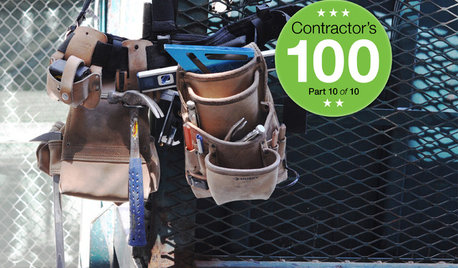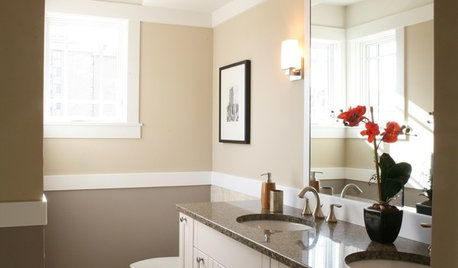January is a bear for me - and although it's been fun here for a few days (and I got some good information - thanks) - I'll probably have to get on to more serious things the next couple of weeks.
Anyway - I'm a retired lawyer who's done 2 condo renovations - 2 office renovations - and built a house - and perhaps I can give you some ideas when it comes to legal issues that might be involved when remodeling a kitchen (or building one in a new house). Note that the answers to these issues will vary a lot state by state - county by county - city by city. So know what the rules are where you live. A few ideas (in no particular order):
1. Except for very minor jobs - you will almost always need to pull a building permit and get inspections. Your GC (if you have one) - should do this. If not - you have to pull it yourself. I recommend using a GC on larger jobs. To pull a building permit - you will need plans - and they will usually have to be signed by someone authorized to sign plans where you live.
2. Get everything in writing. Especially your contract with any GC or sub type people you hire directly. All modifications should be in writing too. A contract doesn't have to be in legalese. If you want the job finished by X - you can just say that in a contract. With a penalty clause if you want. There are specimen contracts on line for many things (contracts with GCs - architects - etc. - various trade groups - like architects - have their own form contracts - but there's no reason they can't be modified). Keep in mind that there is a legal difference between an "architect" (who does plans) and a "supervising architect" (who oversees construction too). Big difference in the cost of the services.
3. Read all the fine print in any contract anyone you deal with wants you to sign. Pay special attention to warranty provisions (especially important with appliances).
4. Make sure who's responsible for what. Like if the granite installer cracks your granite and you need a new slab - who pays for that? If your KD made a plan - you ordered your appliances from an appliance place after it looked at the plans - and the GC built exactly to plans - and that special order appliance that you can't return doesn't fit - what then?
5. Comply with all the mechanics liens laws where you live. Otherwise - you may well wind up paying for the same work twice (once to the GC who doesn't pay the subs or materialmen - and again to the sub or materialmen who don't get paid by the GC). The initial document in Florida is a notice of commencement. A document prepared and filed in court by the owner that has to be posted on the job site. Make sure you don't pay a GC 100% until you have releases of liens from all subs and materialmen (and that should be in your contract when you're figuring out the timing of draws).
6. Watch every episode of Holmes on Homes. The motto of the show being that everything that can go wrong might go wrong. If you're not familiar with exactly how your house is built - the condition of various parts of the house - what's up there in the attic - etc. - make provisions in your contract(s) for contingencies. Especially if you have an older house - where things like the electrical system may not be up to current code - or your circuits may not be able to handle your zippy new appliances. In this regard - I found it easier building from scratch than doing renovations. Specify what happens if - for example - your plan calls for opening a wall - and it turns out the wall is structural. Or - better still - hire a good GC who is capable of checking out as much of this stuff in advance as possible.
7. Use only licensed people for work that needs licenses (like GC work - electrical work - plumbing work - etc.). Don't trust anyone who says "I'm not an electrician - but - no sweat - I know how to do this stuff".
8. Order things early - get the orders in writing - and get delivery times in writing. Get early delivery if possible if delays could hold up your job a lot. You don't want your tile supplier to tell you the tile they thought they could get in a week will take 2 months when the tile installer is scheduled for next week.
9. Get bids in writing on everything. If they're really far apart - ask why (tell the guy with the higher bid about the low ball bid). Getting bids is the way professional jobs are done.
10. And if the "professionals" you're talking with balk at any of this - walk. It's not like we're in the middle of a construction boom in most parts of the country these days.
Anyway - I'd be glad to try to answer any general questions you have about these things (keeping in mind that my answers will probably be general since laws vary so much from place to place). Robyn














pinch_me
blfenton
Related Discussions
Question about Drainage - Legal Issue
Q
Starting a seed business
Q
3 mentally ill roommates and a baby, what to do?
Q
Grown kids in trouble
Q
flwrs_n_co
salmon_slayer
shortyrobynOriginal Author
steff_1
michiganrachel
sparky1981
sherilynn
sparky1981
shortyrobynOriginal Author